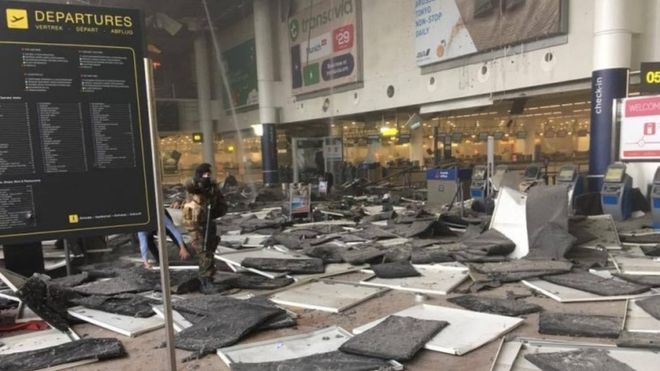Brussels international airport will not reopen before Tuesday, authorities say, following attacks in the Belgian capital that left 31 dead.
Zaventem airport was the first target on 22 March, with two suicide bomb explosions in the departures hall.
An hour later, 20 people died in the suicide bombing of a metro station.
A suspect under arrest for November’s deadly Paris attacks, Salah Abdeslam, has refused to answer questions about the Brussels bombings, prosecutors say.
So-called Islamic State (IS) has said it carried out both the Brussels attacks, and the ones in Paris, in which 130 people died.
US President Barack Obama on Saturday said that Muslims must not be stigmatised following the attacks, as this would play “right into the hands of terrorists”.
Security measures
Brussels airport authorities said the “investigative work related to the judicial inquiry into the airport terminal has been completed” but that passenger activity could not resume before Tuesday.
A team of airport engineers and technicians is being given access to the terminal building for the first time since the attack.
They will assess the damage and stability of the building. The airport authorities will also install new security measures.
The airport check-in area suffered severe damage when two blasts seconds apart hit opposite ends of the departures hall.
Some people fleeing the first blast were caught by the second.
The two suicide bombers there have been identified by DNA as Najim Laachraoui and Brahim el-Bakraoui. They were pictured in an airport CCTV image before the explosions with a third man, on the right of the picture, who has yet to be identified or apprehended.
Image copyright AFP Image caption CCTV footage captured Laachraoui, (left), Brahim el-Bakraoui (middle) and an unidentified man who is still on the run
Brahim’s brother, Khalid el-Bakraoui, carried out the attack on the Maelbeek metro attack.
The BBC’s Anna Holligan in Brussels says buses there are running and most metro stations have reopened but there are still soldiers patrolling the streets and although people are defiant, they are aware that there are possibly still other suspects at large.
Police in Belgium on Saturday continued operations to search for members of the terror cell, in particular the missing man from the airport image and a man suspected of aiding the metro attack.
Media caption Footage from Friday shows bomb disposal experts in Brussels and the moment a suspect was shot in the legs
Twelve people were arrested on Thursday and Friday in Belgium, France and Germany.
The key suspect, Salah Abdeslam, was detained in a raid in Brussels on 18 March. Police said he was initially co-operative.
But Belgian Justice Minister Koen Geens later confirmed in parliament that Abdeslam “no longer wants to talk since [Tuesday’s] attacks”.
The government has come in for criticism that it did not do enough to prevent the attacks.
Two minister offered to resign after Turkey said it had alerted Belgium about Brahim el-Bakraoui, before deporting him.
French President Francois Hollande insisted on Friday that the jihadist network that hit both Paris and Brussels was being “destroyed” but cautioned that threats remained.
Image copyright Belgian police Image caption Laachraoui was only known by the alias Soufiane Kayal until this week
A man arrested on Friday in a Paris suburb, Reda Kriket, 34, was alleged to be in the “advanced stage” of plotting an attack.
In his weekly address on Saturday, President Obama paid his respects to the victims, including the two Americans killed and the 14 injured.
He praised the contribution of Muslim-Americans to US society, saying: “We have to reject any attempt to stigmatise Muslim-Americans.
“Such attempts are contrary to our character, to our values, and to our history as a nation built around the idea of religious freedom. It’s also counterproductive.
“It plays right into the hands of terrorists who want to turn us against one another.”
Meanwhile, US singer Mariah Carey has cancelled her concert, scheduled for Brussels on Sunday, citing security concerns.
More details of those killed in the Brussels attacks have been released. Nationals of 40 countries were caught up in the attacks.
Culled from bbcnews

